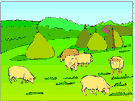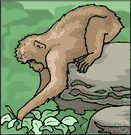pasture
Also found in: Thesaurus, Legal, Idioms, Encyclopedia, Wikipedia.
pas·ture
(păs′chər)n.
1.
a. A tract of land that supports grass or other vegetation eaten by domestic grazing animals.
b. Such vegetation, especially that eaten by domestic grazing animals.
2. The feeding or grazing of animals.
v. pas·tured, pas·tur·ing, pas·tures
v.tr.
1. To herd (animals) into a pasture to graze.
2. To provide (animals) with pasturage. Used of land.
3.
a. To graze on (land or vegetation).
b. To use (land) as pasture.
v.intr.
Idiom: To graze in a pasture.
put out to pasture
1. To herd (grazing animals) into pasturable land.
2. Informal To retire or compel to retire from work or a full workload.
[Middle English, from Old French, from Late Latin pāstūra, from Latin pāstus, past participle of pāscere, to feed; see pā- in Indo-European roots.]
pas′tur·a·ble adj.
pas′tur·er n.
American Heritage® Dictionary of the English Language, Fifth Edition. Copyright © 2016 by Houghton Mifflin Harcourt Publishing Company. Published by Houghton Mifflin Harcourt Publishing Company. All rights reserved.
pasture
(ˈpɑːstʃə)n
1. (Agriculture) land covered with grass or herbage and grazed by or suitable for grazing by livestock
2. (Agriculture) a specific tract of such land
3. (Agriculture) the grass or herbage growing on it
vb
(Agriculture) (tr) to cause (livestock) to graze or (of livestock) to graze (a pasture)
[C13: via Old French from Late Latin pāstūra, from pascere to feed]
Collins English Dictionary – Complete and Unabridged, 12th Edition 2014 © HarperCollins Publishers 1991, 1994, 1998, 2000, 2003, 2006, 2007, 2009, 2011, 2014
pas•ture
(ˈpæs tʃər, ˈpɑs-)n., v. -tured, -tur•ing. n.
1. Also called pas′ture•land` (-ˌlænd) an area of ground covered with plants suitable for the grazing of livestock; grassland.
2. grass or other plants for feeding livestock.
v.t. 3. to feed (livestock) by putting out to graze on pasture.
4. (of land) to furnish with pasture.
5. (of livestock) to graze upon.
v.i. 6. (of livestock) to graze in a pasture.
Idioms: put out to pasture,
a. to put in a pasture to graze.
b. to dismiss or retire as being past one's prime.
[1250–1300; < Middle French < Late Latin pāstūra= Latin pāst(us), past participle of pāscere to feed]
pas′tur•al, adj.
pas′tur•er, n.
Random House Kernerman Webster's College Dictionary, © 2010 K Dictionaries Ltd. Copyright 2005, 1997, 1991 by Random House, Inc. All rights reserved.
pasture
Past participle: pastured
Gerund: pasturing
| Imperative |
|---|
| pasture |
| pasture |
Collins English Verb Tables © HarperCollins Publishers 2011
ThesaurusAntonymsRelated WordsSynonymsLegend:
Switch to new thesaurus
| Noun | 1. |  pasture - a field covered with grass or herbage and suitable for grazing by livestock pasture - a field covered with grass or herbage and suitable for grazing by livestockcommon land, commons - a pasture subject to common use cow pasture - a pasture for cows grassland - land where grass or grasslike vegetation grows and is the dominant form of plant life rural area, country - an area outside of cities and towns; "his poetry celebrated the slower pace of life in the country" |
| 2. |  pasture - bulky food like grass or hay for browsing or grazing horses or cattle pasture - bulky food like grass or hay for browsing or grazing horses or cattlefodder - coarse food (especially for livestock) composed of entire plants or the leaves and stalks of a cereal crop | |
| Verb | 1. | pasture - let feed in a field or pasture or meadow animal, animate being, beast, creature, fauna, brute - a living organism characterized by voluntary movement feed, give - give food to; "Feed the starving children in India"; "don't give the child this tough meat" grass - feed with grass drift - drive slowly and far afield for grazing; "drift the cattle herds westwards" |
| 2. | pasture - feed as in a meadow or pasture; "the herd was grazing" eat, feed - take in food; used of animals only; "This dog doesn't eat certain kinds of meat"; "What do whales eat?" range - let eat; "range the animals in the prairie" |
Based on WordNet 3.0, Farlex clipart collection. © 2003-2012 Princeton University, Farlex Inc.
pasture
noun grassland, grass, meadow, grazing, lea (poetic), grazing land, pasturage, shieling (Scot.) The cows are out now, grazing in the pasture.
Collins Thesaurus of the English Language – Complete and Unabridged 2nd Edition. 2002 © HarperCollins Publishers 1995, 2002
Translations
مَرْعى
pastva
enggræsmark
hagi, beitiland
ganykla
ganības
pasture
[ˈpɑːstʃəʳ]Collins Spanish Dictionary - Complete and Unabridged 8th Edition 2005 © William Collins Sons & Co. Ltd. 1971, 1988 © HarperCollins Publishers 1992, 1993, 1996, 1997, 2000, 2003, 2005
pasture
[ˈpɑːstʃər] n (for sheep, cows) → pâturage mto put cows out to pasture → mettre les vaches au pâturage
to leave for greener pastures → partir vers de nouveaux horizons
to leave for pastures new → partir vers de nouveaux horizonspasture land n → pâturage m, pâturages mpl
Collins English/French Electronic Resource. © HarperCollins Publishers 2005
pasture
n
(= field) → Weide f; to put out to pasture → auf die Weide treiben; (fig inf, employee) → aufs Abstellgleis schieben; greener pastures (fig) → bessere Weidegründe; to move on to pastures new (fig) → sich (dat) → etwas Neues suchen, sich nach neuen Weidegründen (geh) → umsehen; to seek pastures new (fig) → nach neuen Weidegründen suchen
no pl (also pasture land) → Weideland nt
no pl (= food) → Futter nt
vi → grasen
Collins German Dictionary – Complete and Unabridged 7th Edition 2005. © William Collins Sons & Co. Ltd. 1980 © HarperCollins Publishers 1991, 1997, 1999, 2004, 2005, 2007
pasture
[ˈpɑːstʃəʳ] n → pascoloto put animals out to pasture → condurre gli animali al pascolo
to move on to pastures new (fig) → cambiare aria
Collins Italian Dictionary 1st Edition © HarperCollins Publishers 1995
pasture
(ˈpaːstʃə) noun a field or area of ground cove-red with grass for cattle etc to eat. The horses were out in the pasture.
Kernerman English Multilingual Dictionary © 2006-2013 K Dictionaries Ltd.